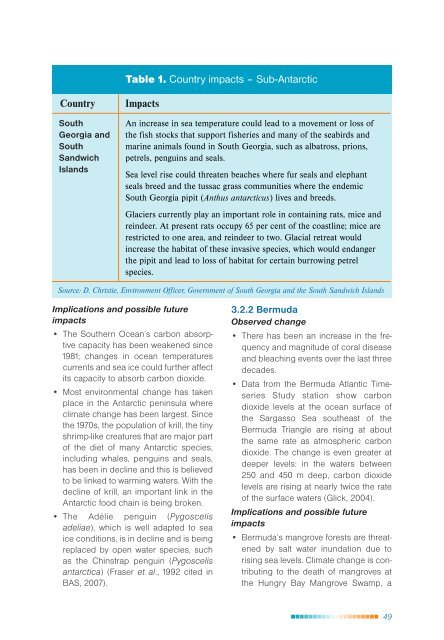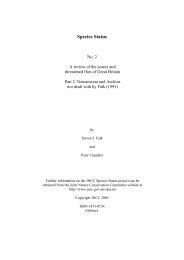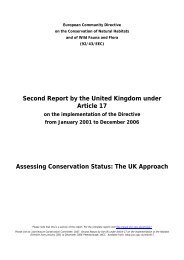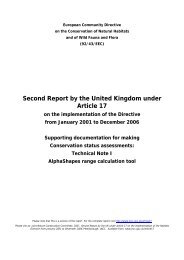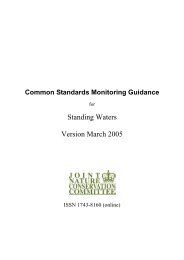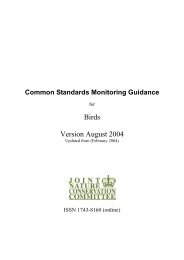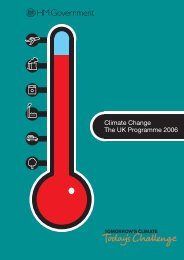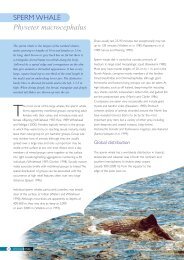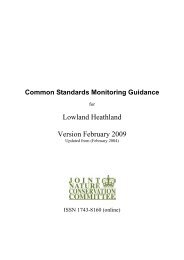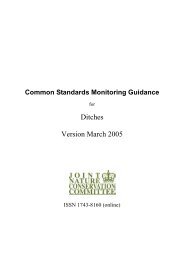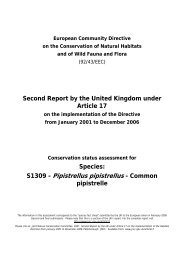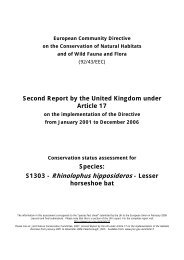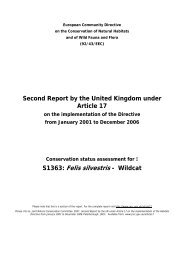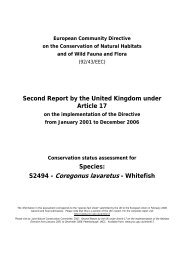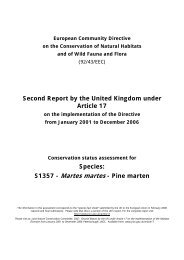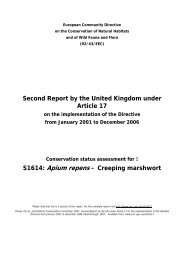Climate change in the UKOTs an overview of the ... - JNCC - Defra
Climate change in the UKOTs an overview of the ... - JNCC - Defra
Climate change in the UKOTs an overview of the ... - JNCC - Defra
Create successful ePaper yourself
Turn your PDF publications into a flip-book with our unique Google optimized e-Paper software.
Country Impacts<br />
South<br />
Georgia <strong>an</strong>d<br />
South<br />
S<strong>an</strong>dwich<br />
Isl<strong>an</strong>ds<br />
Table 1. Country impacts – Sub-Antarctic<br />
An <strong>in</strong>crease <strong>in</strong> sea temperature could lead to a movement or loss <strong>of</strong><br />
<strong>the</strong> fish stocks that support fisheries <strong>an</strong>d m<strong>an</strong>y <strong>of</strong> <strong>the</strong> seabirds <strong>an</strong>d<br />
mar<strong>in</strong>e <strong>an</strong>imals found <strong>in</strong> South Georgia, such as albatross, prions,<br />
petrels, pengu<strong>in</strong>s <strong>an</strong>d seals.<br />
Sea level rise could threaten beaches where fur seals <strong>an</strong>d eleph<strong>an</strong>t<br />
seals breed <strong>an</strong>d <strong>the</strong> tussac grass communities where <strong>the</strong> endemic<br />
South Georgia pipit (Anthus <strong>an</strong>tarcticus) lives <strong>an</strong>d breeds.<br />
Glaciers currently play <strong>an</strong> import<strong>an</strong>t role <strong>in</strong> conta<strong>in</strong><strong>in</strong>g rats, mice <strong>an</strong>d<br />
re<strong>in</strong>deer. At present rats occupy 65 per cent <strong>of</strong> <strong>the</strong> coastl<strong>in</strong>e; mice are<br />
restricted to one area, <strong>an</strong>d re<strong>in</strong>deer to two. Glacial retreat would<br />
<strong>in</strong>crease <strong>the</strong> habitat <strong>of</strong> <strong>the</strong>se <strong>in</strong>vasive species, which would end<strong>an</strong>ger<br />
<strong>the</strong> pipit <strong>an</strong>d lead to loss <strong>of</strong> habitat for certa<strong>in</strong> burrow<strong>in</strong>g petrel<br />
species.<br />
Source: D. Christie, Environment Officer, Government <strong>of</strong> South Georgia <strong>an</strong>d <strong>the</strong> South S<strong>an</strong>dwich Isl<strong>an</strong>ds<br />
Implications <strong>an</strong>d possible future<br />
impacts<br />
• The Sou<strong>the</strong>rn Oce<strong>an</strong>’s carbon absorptive<br />
capacity has been weakened s<strong>in</strong>ce<br />
1981; <strong>ch<strong>an</strong>ge</strong>s <strong>in</strong> oce<strong>an</strong> temperatures<br />
currents <strong>an</strong>d sea ice could fur<strong>the</strong>r affect<br />
its capacity to absorb carbon dioxide.<br />
• Most environmental <strong>ch<strong>an</strong>ge</strong> has taken<br />
place <strong>in</strong> <strong>the</strong> Antarctic pen<strong>in</strong>sula where<br />
climate <strong>ch<strong>an</strong>ge</strong> has been largest. S<strong>in</strong>ce<br />
<strong>the</strong> 1970s, <strong>the</strong> population <strong>of</strong> krill, <strong>the</strong> t<strong>in</strong>y<br />
shrimp-like creatures that are major part<br />
<strong>of</strong> <strong>the</strong> diet <strong>of</strong> m<strong>an</strong>y Antarctic species,<br />
<strong>in</strong>clud<strong>in</strong>g whales, pengu<strong>in</strong>s <strong>an</strong>d seals,<br />
has been <strong>in</strong> decl<strong>in</strong>e <strong>an</strong>d this is believed<br />
to be l<strong>in</strong>ked to warm<strong>in</strong>g waters. With <strong>the</strong><br />
decl<strong>in</strong>e <strong>of</strong> krill, <strong>an</strong> import<strong>an</strong>t l<strong>in</strong>k <strong>in</strong> <strong>the</strong><br />
Antarctic food cha<strong>in</strong> is be<strong>in</strong>g broken.<br />
• The Adélie pengu<strong>in</strong> (Pygoscelis<br />
adeliae), which is well adapted to sea<br />
ice conditions, is <strong>in</strong> decl<strong>in</strong>e <strong>an</strong>d is be<strong>in</strong>g<br />
replaced by open water species, such<br />
as <strong>the</strong> Ch<strong>in</strong>strap pengu<strong>in</strong> (Pygoscelis<br />
<strong>an</strong>tarctica) (Fraser et al., 1992 cited <strong>in</strong><br />
BAS, 2007).<br />
3.2.2 Bermuda<br />
Observed <strong>ch<strong>an</strong>ge</strong><br />
• There has been <strong>an</strong> <strong>in</strong>crease <strong>in</strong> <strong>the</strong> frequency<br />
<strong>an</strong>d magnitude <strong>of</strong> coral disease<br />
<strong>an</strong>d bleach<strong>in</strong>g events over <strong>the</strong> last three<br />
decades.<br />
• Data from <strong>the</strong> Bermuda Atl<strong>an</strong>tic Timeseries<br />
Study station show carbon<br />
dioxide levels at <strong>the</strong> oce<strong>an</strong> surface <strong>of</strong><br />
<strong>the</strong> Sargasso Sea sou<strong>the</strong>ast <strong>of</strong> <strong>the</strong><br />
Bermuda Tri<strong>an</strong>gle are ris<strong>in</strong>g at about<br />
<strong>the</strong> same rate as atmospheric carbon<br />
dioxide. The <strong>ch<strong>an</strong>ge</strong> is even greater at<br />
deeper levels: <strong>in</strong> <strong>the</strong> waters between<br />
250 <strong>an</strong>d 450 m deep, carbon dioxide<br />
levels are ris<strong>in</strong>g at nearly twice <strong>the</strong> rate<br />
<strong>of</strong> <strong>the</strong> surface waters (Glick, 2004).<br />
Implications <strong>an</strong>d possible future<br />
impacts<br />
• Bermuda’s m<strong>an</strong>grove forests are threatened<br />
by salt water <strong>in</strong>undation due to<br />
ris<strong>in</strong>g sea levels. <strong>Climate</strong> <strong>ch<strong>an</strong>ge</strong> is contribut<strong>in</strong>g<br />
to <strong>the</strong> death <strong>of</strong> m<strong>an</strong>groves at<br />
<strong>the</strong> Hungry Bay M<strong>an</strong>grove Swamp, a<br />
49


